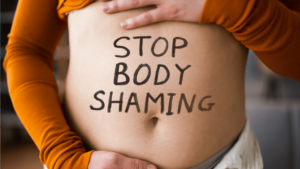Have you looked in the mirror lately and criticized your body? We may not be aware of it, but we are often self-conscious of our body shape, size, and weight. We often tell ourselves we are too thin or too fat, too light or too dark, too curly or too straight.
The teenage years serve as the transition from childhood to adulthood and is marked by physical, mental, and sexual developmental changes. It is during these times we become overly conscious about our looks and physical appearance, including our weight. Adolescents, above all, are particularly vulnerable to body shaming and weight shaming during this stage. Teenagers strive to be accepted by their peers by having the right body, color, hair – anything acceptable by society.
In this highly social-media based world, appearance and attractiveness have been an important thing to consider, especially among teenagers today. The Internet now strongly has an influence against what the ideal person should be. If you look different from what the media portrays as beautiful, you may fall victim of body shaming.
What is Body Shaming?
Body shaming can be described as the act of mocking or humiliating someone based on their physical appearance. It covers a wide scope including shaming people for their shape, size, skin color, hair color, hairiness, and general appearance.
Globally, the prevalence of body shaming was found to be in the range of 25 to 35 percent. In one study, the total prevalence of body shaming was found to be 44.9 percent. Body shaming stems from several years back when ideals surrounding women have changed. Thin women were considered more attractive than heavier women, and men who were taller and muscular were preferred than lanky ones. Since then, standards of beauty for women have been generally unrealistic and unattainable.

Body shaming may be considered a form of bullying. It includes making inappropriate or derogatory comments about their body size or shape. Body shaming is not merely criticizing someone who is overweight, but even those who are underweight. People of all shapes and sizes can be victims of body shaming. Even when said in a joking manner, body shaming is still hurtful. Oftentimes, body shaming is subtly told, often using sentences like:
- “Why are you so thin?”
- “Do you even eat?”
- “You should eat more”
- “You look like you gained weight”
- “Don’t you have plans of dieting?”
- “Are you really going to eat all of that?”
We may not realize it, but we are unconsciously body shaming ourselves and others.
Body Shaming and Mental Health
The stigma surrounding weight and body type can have long-term psychological and physical health consequences. Recent studies have shown that people with disproportionate bodies are often stigmatized.
Studies indicate that the effects of being body-shamed during adolescence have short-term and long-term mental health consequences. Several mental health issues arise from body shaming, such as low self-esteem, anxiety, and depressive symptoms.
When someone is body shamed, it can lead to feelings of avoidance and opting to isolate oneself due to the humiliation felt. There is also a note of increase in feelings of low self-esteem, self-image, and self-worth. Worse, it can make a person feel lonely and sorry for oneself – which can lead to depression.
Additionally, body shaming can lead to unhealthy eating habits. It can go both ways of the spectrum: eating too much to gain weight or refusing to eat in order to lose weight. This can put people at risk of suffering from an eating disorder.
What Can We Do About Body Shaming?
There have been several movements focusing on body positivity. This promotes correcting and educating people about biases and prejudices against body shaming. It will take time to change people’s perspectives and ideals, but it is always better to start now than later. The question now is, how do we fight against body shaming?
1. Embrace our own
Body positivity as opposed to body shaming is learning to embrace your own imperfections and feeling content with how we are and how we look. Once we have fully embraced how we look, no amount of judgment that may be directed towards us can put us down.
2. Maintain healthy relationships
A study showed that maintaining peer friendships inside the school offers a protective risk against the depressing effects of body shaming. Surround yourself with people who are body positive and accept you for who you are – without forcing you into society’s impossible standards. Spend time with people who will help you view yourself positively and prohibit any semblance of body shaming.
3. Educate those who body shame
Body shaming is not pleasant and should not be tolerated. Notice how people around you – your friends, families, or co-workers. If you catch anyone body shaming another, confront and educate them. Talk it out nicely and discuss the harmful effects of body shaming a person.

At the end of the day, we want to be accepted for who we are and how we look. However, adolescents can be very vulnerable to body shaming and its negative mental health consequences.
If you know anyone who is a victim of body shaming, especially adolescents, contact the nearest MindShift Wellness Center near me today. We offer Teen Therapy as well as Group Therapy, wherein you can talk with people with the same experience. We can help you improve your self-image and speed up your path to acceptance and recovery.



